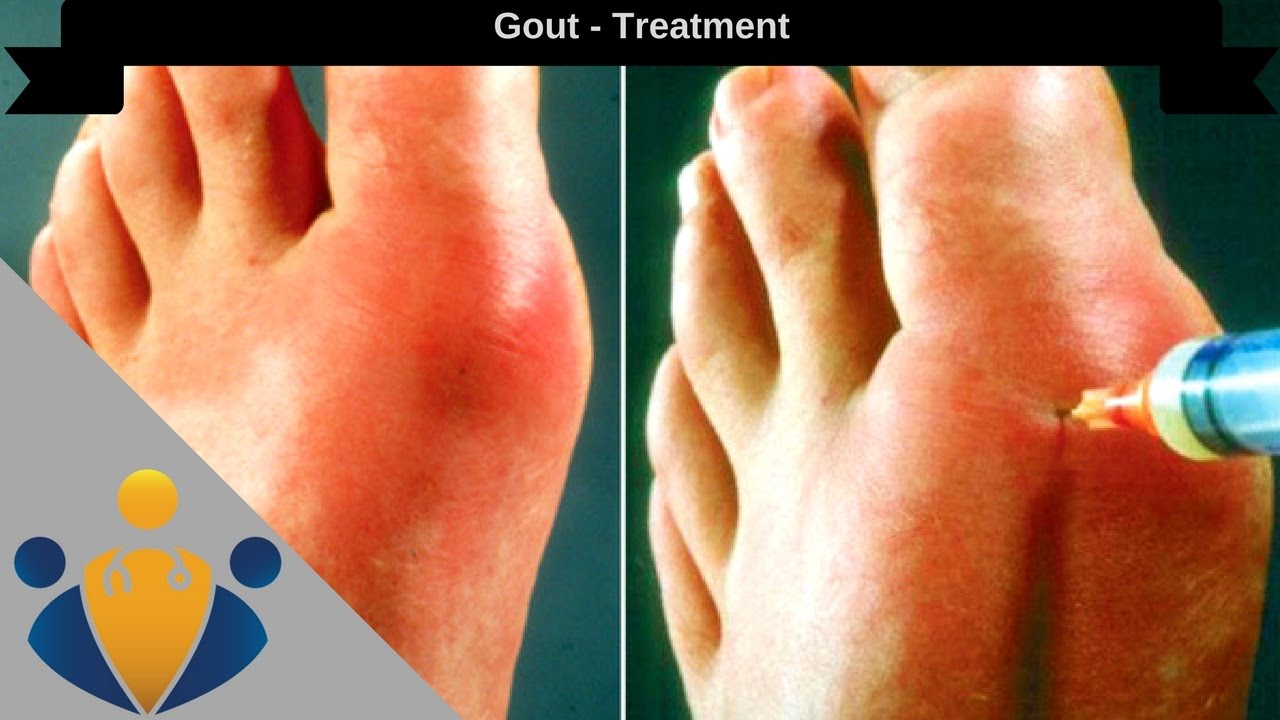Before Taking This Medicine
You should not use febuxostat if you are allergic to it, or if you also use:
-
azathioprine or
-
mercaptopurine.
Taking febuxostat may increase your risk of serious or fatal heart problems. Talk with your doctor about the risks and benefits of febuxostat.
Tell your doctor if you have ever had:
-
heart problems
-
an organ transplant .
Tell your doctor if you are pregnant or breastfeeding.
Home Remedies And Lifestyle
Gout symptoms are caused by the excessive accumulation of uric acid, a condition known as hyperuricemia. Over time, the build-up can lead to the formation of uric acid crystals in and around a joint, triggering severe and protracted bouts of pain and inflammation.
As such, gout treatment is focused on two things: the reduction of uric acid and the alleviation of gout pain.
Pathophysiology And Risk Factors
Genetic mutations may be associated with overproductionor more often underexcretionof uric acid because of defects in the renal urate transporter system.6 The prevalence of gout increases with age and peaks at more than 12% in persons older than 80 years.1 Because female sex hormones increase urinary excretion of uric acid, pre-menopausal women have a substantially lower prevalence of gout compared with men .6 Black persons have a higher risk.7 Consuming alcoholic drinks , meat , some seafood , fruit juice, and beverages sweetened with high-fructose corn syrup increases the risk of gout.8,9 Purine-rich foods such as nuts, oatmeal, asparagus, legumes, and mushrooms do not seem to increase the risk.10 Consumption of dairy products appears to confer slight protection from gout10 .
Diuretic use*
| Relative risk | |
|---|---|
|
50 g per day vs. none |
2.53 |
|
2 drinks per day vs. none |
2.51 |
|
2 drinks per day vs. none |
1.60 |
|
2 drinks per day vs. none |
1.05 |
|
30 kg per m2 at 21 years of age |
2.14 |
|
2 drinks per day vs. none |
1.85 |
|
1,500 mg vs. < 250 mg per day |
0.55 |
|
6 cups per day vs. none |
0.41 |
*Adjusted for age.
Adapted with permission from Roddy E, Doherty M. Epidemiology of gout. Arthritis Res Ther. 2010 12:223, with additional information from reference 12.
Diuretic use*
*Adjusted for age.
Adapted with permission from Roddy E, Doherty M. Epidemiology of gout. Arthritis Res Ther. 2010 12:223, with additional information from reference 12.
Hard nodules on distal digit.
Recommended Reading: How To Treat Gout Over The Counter
Is Medication Necessary For Gout
Depending on the severity of pain, frequency of attacks and the severity of your attack, medication may be a good option. If it is an acute gout attack, simple changes to your diet and lifestyle can help prevent a future flare up. Itâs a good idea to see a doctor to gain an understanding on your uric acid levels and to see if there are any other conditions that are contributing to your gout.
A Comprehensive Look At Gout Medications

If you suffer from gout then there are two ways your doctor can treat your gout with medication. First theres the preventative gout medication, those that you take daily to keep uric acid levels normal and medication that help you during gout attacks, when you are most in pain, discomfort and wanting relief.
The medication your doctor recommends will be based on your present health status and your personal preferences. Most likely your doctor will combine a short term and long term option for ideal results. Gout medications are divided into either short-term or long-term.
Short-term medication will treat your gout attack providing you with pain relief and reduced inflammation on the affected joint. At the same time it can prevent from another attack taking place. With these medications once you take the first dose, usually you can expect relief from your symptoms within 24 hours of use. Your doctor will usually prescribe you a medication that will be used for a short period of time and no longer than a week.
The list of short-term medications include the following:
The list of long-term gout medications include the following:
- : it functions the same way as allopurinol by decreasing uric acid levels in the blood. goes by the brand name Uloric. It is metabolized by the liver, so its considered safe for those suffering from kidney disease.
You May Like: Is Ice Cream Good For Gout
What Increases Your Chances For Gout
The following make it more likely that you will develop hyperuricemia, which causes gout:
- Being male
Paula Felt Like Her Heart Was Racing And She Couldnt Sleep When She Took Steroids But They Did Improve Her Symptoms
Did you experience side effects from taking them?What kind of thing?How long were you supposed to take them for?So did you usually take them for the amount of time that you were prescribed them for?Its difficult.Its a difficult decision to make. So when you were prescribed them, what did you expect them to do for you?Medication to prevent attacks and long-term problems
Read Also: Is Orange Good For Gout
What If I Forget To Take It
If you take allopurinol:
- once a day take the missed dose as soon as you remember. If you do not remember until the following day, skip the missed dose.
- twice or more a day – if you do not remember until your next dose is due, skip the missed dose and take the dose that is due.
Never take a double dose to make up for a missed dose.
If you often forget to take your medicines, it may help to set an alarm to remind you. You could also ask a pharmacist for advice on ways to help you remember to take your medicines.
Risk Factors For Gout
Gout is more likely to occur in:
- Men. Men have a seven to nine times higher risk of gout than women, although the risk increases for women after menopause
- People with a diet high in purine-rich foods such as red meat, organ meats , seafood . Processed foods , refined carbohydrates and beverages high in fructose or sucrose also contribute to gout
- Certain ethnicities
- People who overindulge in alcohol, particularly beer and spirits
- People with certain medical conditions , and with some medications or treatments .
You May Like: What’s Bad For Gout
Other Ways To Treat Gout
Medicine is considered the most effective treatment method for gout, but there are lifestyle changes you can make to manage your symptoms during a gout attack, or help prevent gout attacks from happening. Learn more about other ways to manage symptoms of gout during an attack here. Learn more about preventing future gout attacks here.
Educational content made possible by Horizon Therapeutics.
When Should Someone Seek Medical Care For Gout
Anyone who has a sudden onset of a hot, red, swollen joint should seek medical care, either with a primary care physician, at an emergency department, or with a rheumatologist . These symptoms can also be due to an infection, loss of cartilage in the joint, or other reasons. It is important to make an accurate diagnosis of gouty arthritis for optimal treatment.
If one has been diagnosed with gout and has had more than one attack of arthritis, take the medication prescribed by a physician for these attacks. The individual should be seen by a physician, in the emergency department, or urgent care center if the attack does not respond to this treatment. The individual may need regular medications to prevent further arthritis flares.
Attacks of abdominal pain due to kidney stones may be related to uric acid kidney stones from gout.
Recommended Reading: Pictures Of Gout In Your Foot
How Do Doctors Diagnose Gout
Joint aspiration
- This is the most important diagnostic test. It is the ultimate method of being certain of a diagnosis of gouty arthritis, as opposed to other causes such as an infection in the joint.
- A needle is inserted into the joint to withdraw a sample of fluid for testing.
- The fluid is examined under a microscope to see if there are gout crystals or signs of a bacterial infection present. Sometimes other crystals can be found in the joint fluid, such as calcium pyrophosphate, which is caused by an entirely different condition called pseudogout .
- Gouty arthritis is sometimes diagnosed based on the typical clinical presentation without a joint aspiration.
Blood tests
- A doctor may obtain a blood sample to look at cell counts, uric acid levels, kidney function, etc.
- Unfortunately, the level of uric acid in the blood cannot be reliably used to make a diagnosis of gout. It is normal in approximately 10% of people during an acute attack of gouty arthritis. Moreover, uric acid levels are elevated in 5%-8% of the general population, so the presence of an elevated level does not necessarily mean that gout is the cause of an inflamed joint. Interestingly, the uric acid is typically lowered during a flare of inflammatory gouty arthritis. Therefore, the optimal time to measure the uric acid is after a flare has resolved when acute inflammation is not present.
Radiographs
How Should I Use Allopurinol

Take allopurinol exactly as prescribed by your doctor. Follow all directions on your prescription label and read all medication guides or instruction sheets. Your doctor may occasionally change your dose.
Take allopurinol oral with a full glass of water. To reduce your risk of kidney stones forming, drink 8 to 10 full glasses of fluid every day, unless your doctor tells you otherwise.
If this medicine upsets your stomach, take allopurinol oral after a meal.
Allopurinol injection is given as an infusion into a vein if you are unable to take the medicine by mouth. A healthcare provider will give your first dose and may teach you how to properly use the medication by yourself.
You may need to mix the injection with a liquid in an IV bag. When using injections by yourself, be sure you understand how to properly mix and store the medicine. Ask your doctor or pharmacist if you don’t understand all instructions.
Prepare an injection only when you are ready to give it. Do not use if the medicine has changed colors or has particles in it. Call your pharmacist for new medicine.
You may need frequent medical tests. Even if you have no symptoms, tests can help your doctor determine if allopurinol is effective.
You may have gout attacks more often when you first start taking this medicine oral. Your doctor may recommend other gout medication to take with allopurinol. Keep taking the medicine as directed.
Store at room temperature away from moisture and heat.
Also Check: How To Lower Uric Acid For Gout
What Medication To Avoid With Gout
It is best to discuss with your doctor the medications that should not be taken with gout. An over-the-counter medication to avoid is aspirin as it can exacerbate your gout attack and increase uric acid levels. Other medications such as those that treat high blood pressure, heart failure or diuretics can interact negatively with gout and gout medications. Speak to your doctor about other concerns.
How Fast Does Gout Medication Work
Short-term drugs can provide relief within 24 to 48 hours. Long-term medications are designed to work concurrently with necessary lifestyle and dietary changes and are solely dependent on your personal effort. Some patients have shown progress within a monthâs times, while others can take up to a year.
Also Check: Is Tofu Bad For Gout
Other Safer And More Effective Treatments Are Available To Treat The Pain From Gout Attacks
When gout, a type of inflammatory arthritis, flares up, the pain can be awful. Many patients say that simply having a bed sheet brush against an inflamed joint is excruciating. While its clear why a gout attack would lead many people to the emergency room in search of prompt relief, a new study suggests that many of gout patients arent being treated properly there.
According to the study, which was published in the journal Arthritis Care & Research, more than 28 percent of gout patients who were discharged from a hospital or ER between 2015 and 2017 left with a prescription for opioid pain medication. These findings were based on data from medical records of 456 patients.
While opioids often work well for severe pain, they do not help to reduce inflammation associated with a gout flare. Opioids also come with several possibly serious side effects, including confusion, dizziness, constipation, and addiction. These risks are more likely with long-term use, and this study found that 25 percent of the patients who left the hospital with an opioid prescription were given enough of the drug to last at least 14 days .
Get Answers Advice And Medicine
The pain from a gout attack usually gets better in 3 to 10 days. But youâll feel better faster if the gout is treated. If you think you might have it, contact your doctor. An exam and tests will show if itâs gout or something else, like an infection.
Talk with your doctor about the best medicines for you. The type will depend on how well your kidneys work, the possible side effects, and other health issues.
Recommended Reading: Natural Remedies For Gout In Foot
Lowering Uric Acid Levels
Standard urate-lowering medicines are:
- Allopurinol This is an oral prescription that helps lower serum uric acid levels. This medicine is also known by brand names Lopurin® and Zyloprim®. When started on this drug, your doctor will likely gradually increase the dosage to a standard prescription dose.
- This is another urate-lowering therapy that can be prescribed under the brand name Uloric®. This medication is taken orally and decreases the bodys production of uric acid. It can be taken by people with mild to moderate kidney or liver disease.
Some general potential side effects of allopurinol are: changes in taste, diarrhea, indigestion and stomach pain or cramps. For febuxostat, some minor side effects are: changes in appetite, constipation or diarrhea, nausea, hot flush to face or skin, stomach upset or pain. Its important that if they persist or there are questions, call a doctor.
Though only 1 in 1,000 patient cases, there is a more severe hypersensitivity reaction to allopurinol, with fever or rash that can cover the body and deterioration of liver and kidney function. At-risk patient populations can be screened for a genetic marker that can predict this reaction. To alleviate this hypersensitivity, doctors will start a patient on a low dose with a step-up plan to the optimal medication dose.
Why Treating Gout Takes A 2
Gout treatment takes a two-pronged approach:
You May Like: Is Beans Good For Gout
What Is The Fastest Way To Get Rid Of Gout
Medications for acute gout attack: These medications are usually prescribed to treat an acute attack of gout:
- Nonsteroidal anti-inflammatory drugs : These can quickly relieve the pain and swelling of an acute gout episode. They can shorten the attack, especially if taken in the first 24 hours.
- Corticosteroids: These drugs can be taken by mouth or injected into an inflamed joint to quickly relieve the pain and swelling of an acute attack. Corticosteroids usually start working within 24 hours after they are taken.
- Colchicine: An anti-inflammatory medicine that works best if taken within the first 24 hours of a gout attack.
Medications for reducing uric acid levels: These are usually prescribed after an acute attack ends to reduce uric acid levels in the body to prevent future attacks.
- Colchicine: Regular and low doses of colchicine may be given along with other medications below to prevent flare-ups.
- Allopurinol: It reduces uric acid production in the body.
- : It reduces uric acid production in the body.
- Probenecid: It acts on the kidneys to help eliminate uric acid.
- Pegloticase: This is a medication that is injected every 2 weeks. It reduces uric acid quickly and used when other medications fail.
Lifestyle and home remedies to treat acute gout and can prevent recurrent attacks:
- Limiting or avoiding alcohol consumption and drinks sweetened with fructose
- Limiting intake of foods high in purines, such as red meat, organ meats, and seafood
- Drinking plenty of fluids
How To Take Colchicine

- Before you start the treatment, read the manufacturer’s printed information leaflet from inside the pack. It will give you more information about colchicine and will provide you with a full list of the side-effects which you may experience from taking it.
- You must take colchicine exactly as your doctor tells you to. Most doctors will recommend that when a gout attacks starts, you should take one tablet 2-4 times a day until the pain eases. It is important that you do not take more than 12 tablets of colchicine as a course of treatment during any one gout attack. It is also important that you leave at least three days between courses of colchicine. If you find you are having frequent attacks of gout, please let your doctor know about this.
- If you have recently been prescribed a medicine to prevent gout attacks and you have been given colchicine to prevent a flare-up attack of gout, the usual dose for this is one tablet twice each day.
- Take colchicine tablets with a drink of water.
- If you forget to take a dose, take it as soon as you remember unless it is nearly time for your next dose, in which case leave out the missed dose. Do not take two doses together to make up for a forgotten dose.
Recommended Reading: Is There A Permanent Cure For Gout